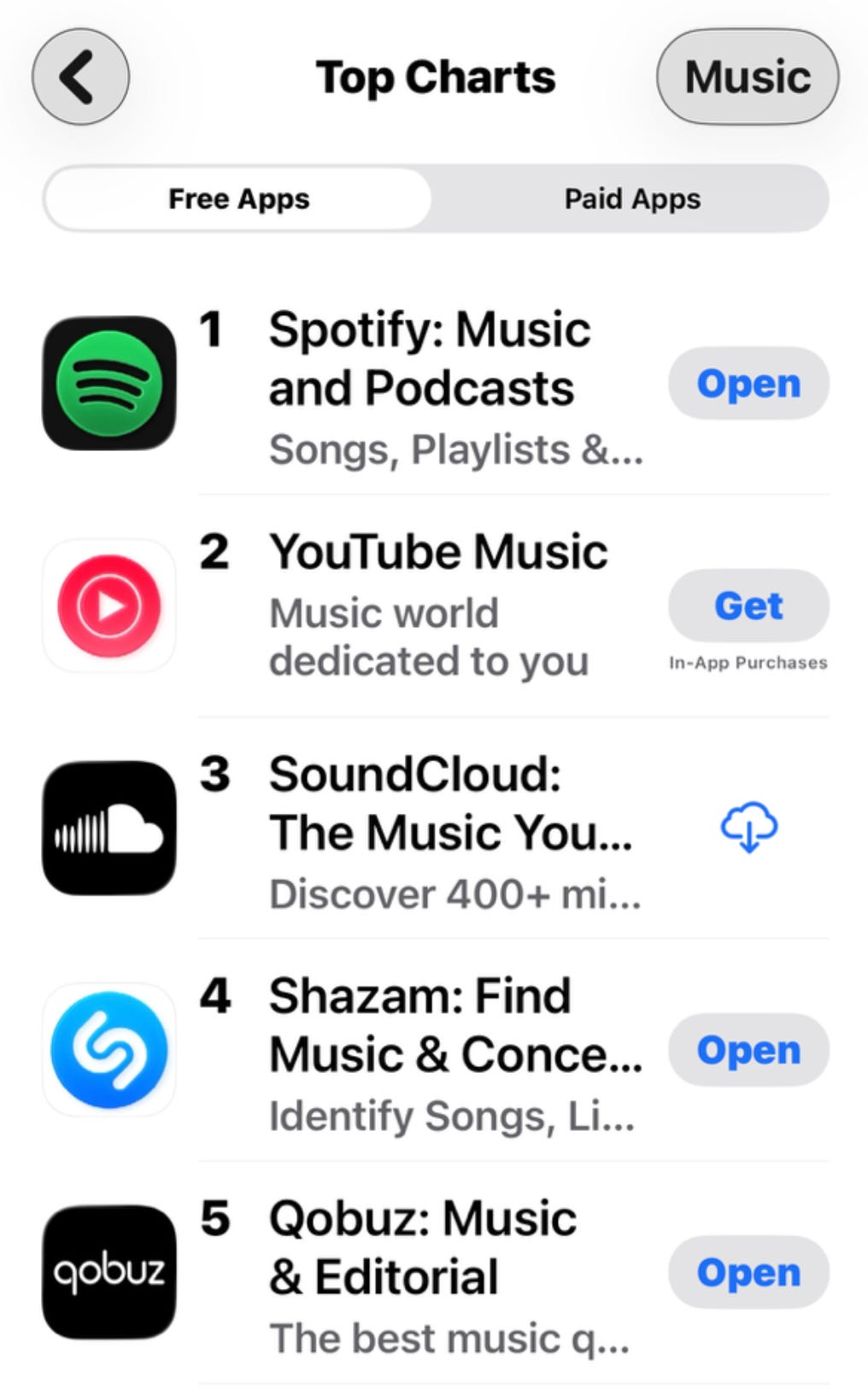🔵 Further small signs of consumer fatigue with Spotify
Plus: what's going on with that Massive Attack Spotify boycott?
Much has been made of late of the general narrative that Spotify is not a good platform for artists. Ironically, a chunk of that has boiled down to Daniel Ek’s investments in defence tech, which is certainly an angle that’s problematic on some levels. (In short: aren’t the likes of Google equally invested in ethically questionable tech, and if so why is no one boycotting YouTube, for example?).
Generally though, this anti-Spotify march has been artist-led, with various bands/artists announcing they are pulling their music from the platform. A solid gesture, without question, but not necessarily one that was suggestive of Joe Public itself potentially getting tired of the dominant music service.
As some know, I now use Qobuz for my main streaming service, and full disclosure, I was comped an account after expressing some interest in trying it out. I love the high quality audio on it, and appreciate the generally clutter-free interface that just focuses on music. Not videos, not podcasts, not audiobooks - just music. Couple that with solid editorial (and simple features like being able to filter new releases by genre!) and for me it’s a winner, and would only be improved by 1) support for Dolby Atmos, and 2) a slightly deeper catalogue selection, the latter of which is less the platform’s fault and more that of certain labels etc who have not submitted their work there yet. (I should note too that we’re talking about serious outliers, so it’s a minimal issue in the main).
I was pleasantly surprised then, when Qobuz suddenly spiked at No. 5 in the Apple App Store’s Music section last week:
With no disrespect to Qobuz, it has been something of an underdog in the streaming stakes; undoubtedly the likes of Apple and Deezer dwarf them for users. However that’s precisely why this was notable: it suggests that consumers are looking around and potentially testing new services. That is interesting in and of itself, if it is signposting a move many have been predicting for a while now, namely a desire to explore services that focus more on just music, and with more of a sense of quality rather than quantity.
Is the move likely to affect Spotify’s share price? I doubt it… for now. But the very fact that people are trialling other services is notable.
Does this speak to the wider issues surrounding streaming and the economics thereof? No, not at all: the underlying payment models remain the same, and therefore still maintain the inequities that they always have. What this does do, however, is speak to more qualitative platforms that place more value on arts and culture, and if that continues, that’s a victory of its own.
Keeping with Spotify: much was made of Massive Attack’s decision to remove its music from the platform, for all the reasons stated above (Ek’s investments, a general issue with the platform and its model etc).
There’s just one issue: none of that music has come down, at least at the time of writing. All the albums remain online to play some six weeks later.
So what’s happening there? I certainly don’t believe this was a hollow statement on the band’s part; they have shown repeatedly to be people of action, and committed to their beliefs. Could it be, therefore, that they actually don’t have the power to take the music down? Are Universal, who manage the band’s catalogue, pushing back?
Who knows what the reasons are (and if they are publicly shareable, by all means let me know and I’ll issue an update here), but I wonder if this also shines a light on the complex nature of these deals, and if so, whether that raises questions as to just how much power artists signed to major labels have in 2025 to take their music down. New deals may have evolved to cover these kind of situations. Old ones? Perhaps not so much.
An interesting space to watch.
Have a great day,
D.
🎶 Listening to “Auratones” by Deepchord. I’ve become a bit obsessed with this album of late, which typifies Rod Modell’s output in his Deepchord guise, fusing a dub techno approach with greater levels of ambience. At points you’re almost hearing a track fighting against layers of hiss, ambient samples and other sounds, but that breathes dimension and life into this all, making it quite the listen - especially if, like me, you’re strolling around central London with it on. Glorious stuff.
📖 Reading “The Migraine Brain”, which I’ve taken to after having another nasty run in with migraine with aura in recent weeks. I decided I wanted to learn more about the whole topic, and this book has proven extremely informative. If you’re a fellow migraineur (because yes, that’s the term!) then this might be worth a look.
📺 Watching “LAIMA & IGGOR AT DEEWEE X BECAUSE - PARIS 2025” on YouTube. I still struggle to wrap my head around the fact that Iggor Cavalera, legendary drummer of thrash metal legends Sepultura, is now the drummer in Soulwax and a member of the band’s wider Deewee crew. Igoor also stepped out at last week’s Because Music anniversary bash in Paris, and this set alongside Laima was definitely a banger. Enjoy!



Also noticed some playlist transfer apps surging up the charts. I think anger with Spotify is real. Skeptical it will lead to notable loss of market share, especially in the US
My experience is that when you ‘take your music down’ from Spotify, it can take a minimum of 30 days and in many cases well over that. While that seems odd in a digital environment, most artists are not dealing directly with Spotify, rather they release music through their labels and distributors who then it into the streamers and I guess the reverse is true on the way out.